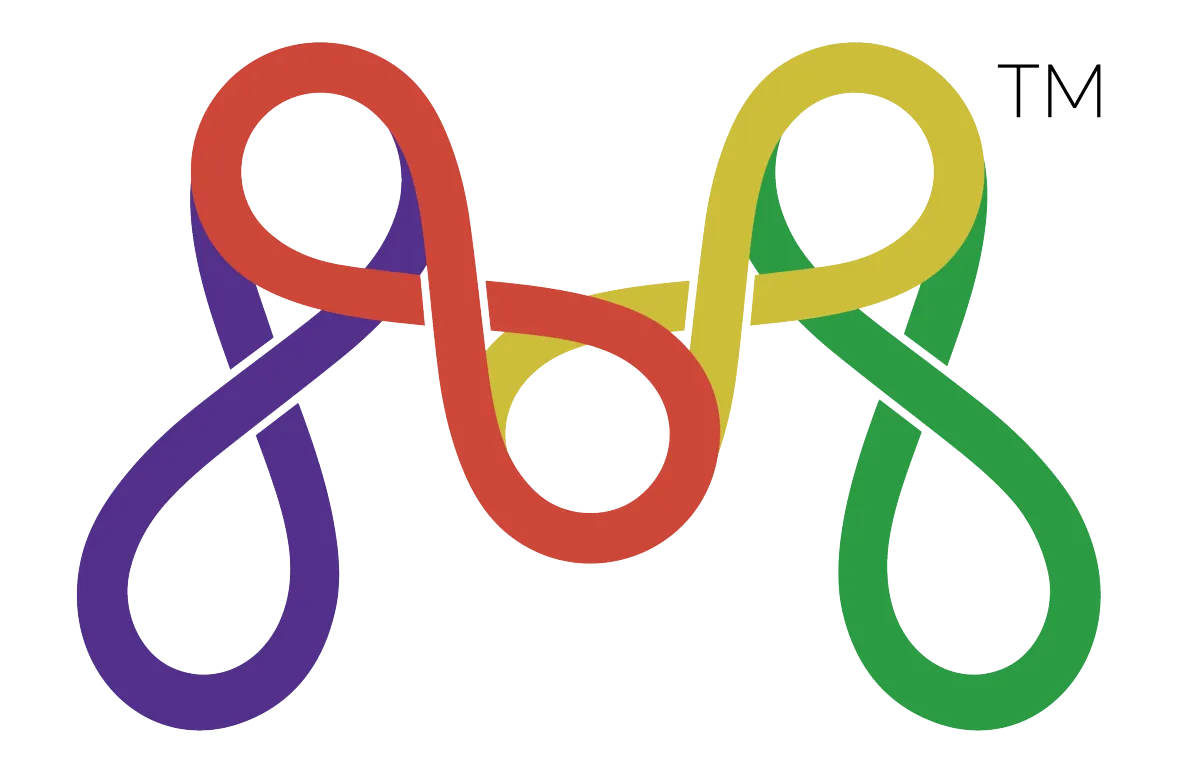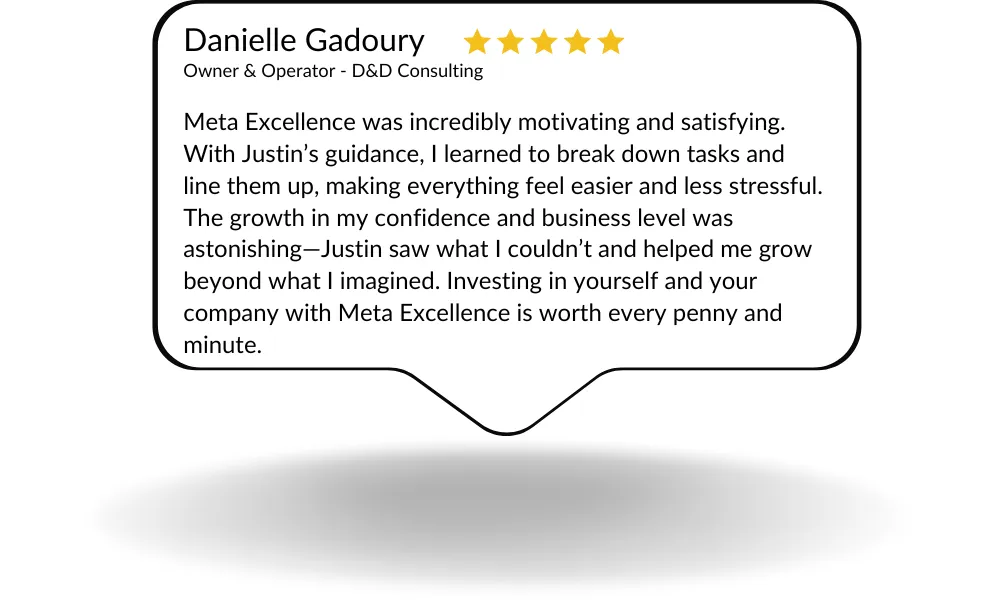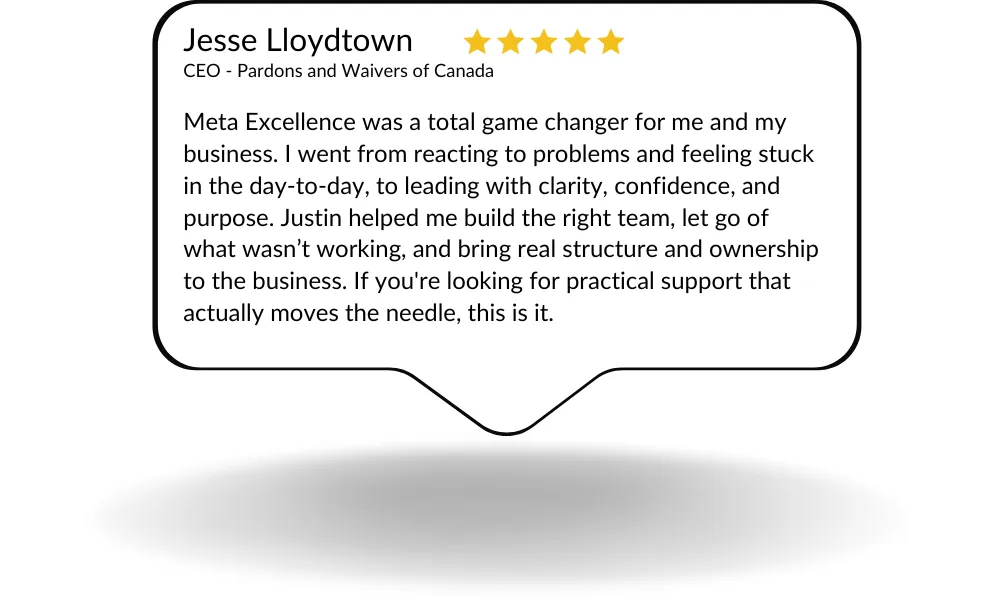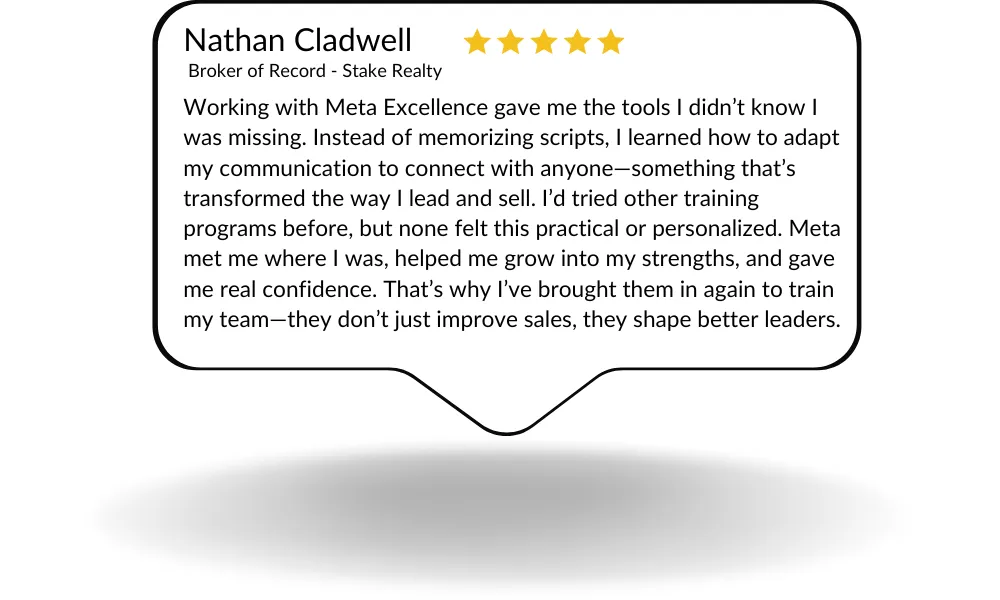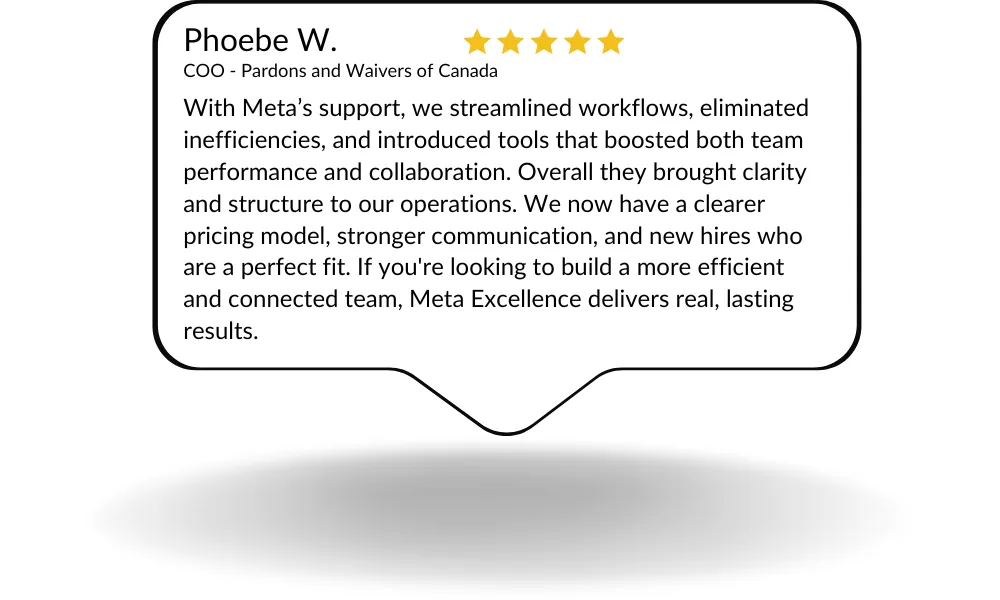Thinking. Feeling.
Doing. Being.
The Meta-X program combines expertise from science, art, leadership, and training in a manner that is transferable across all disciplines.



Our Distinctive Edge
The Meta Excellence Difference

Symbiotic Solutions
Infuses into your daily activity to get maximum results.
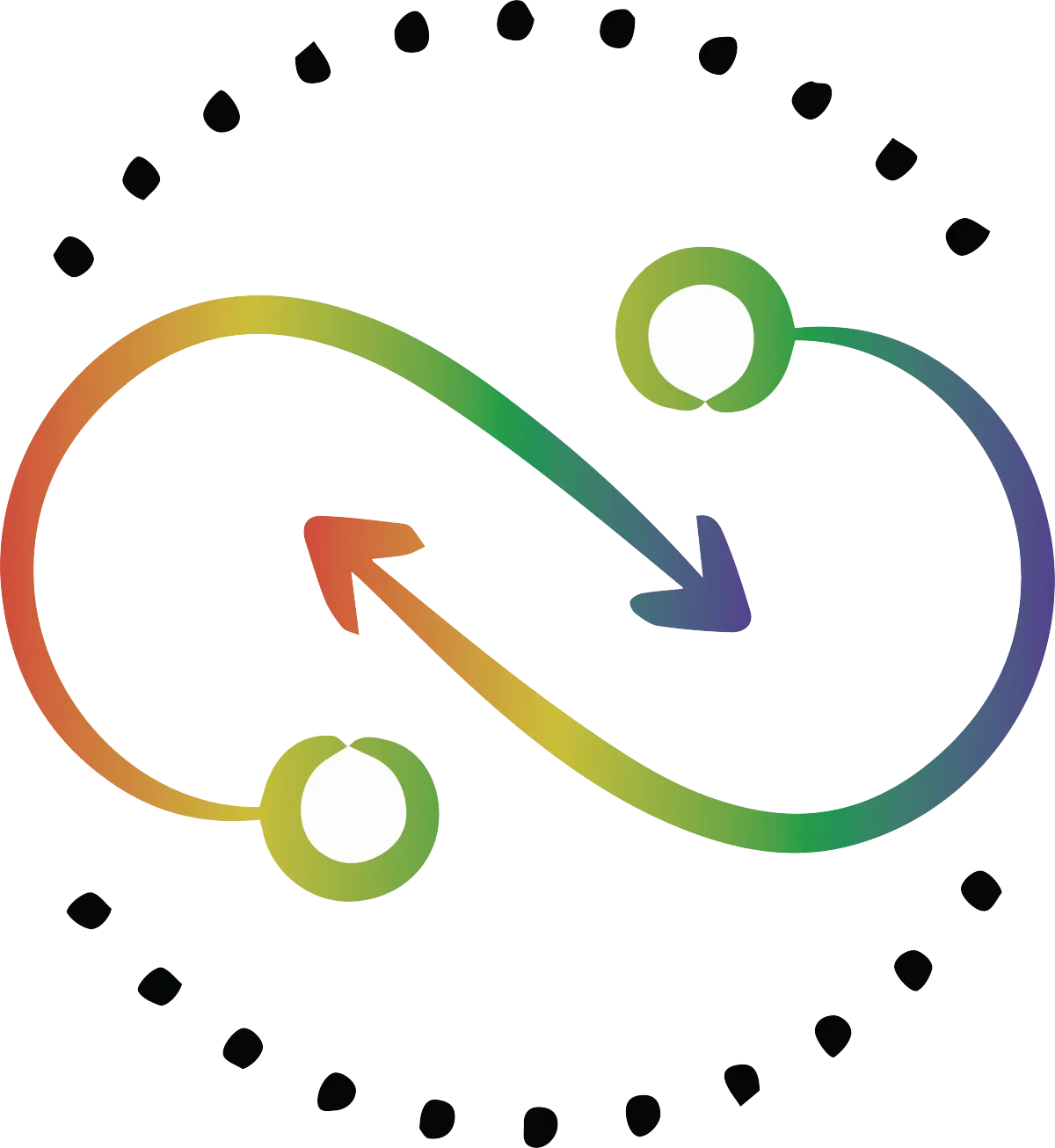
Transferable Results
Deep learning that transforms life in and out of business.
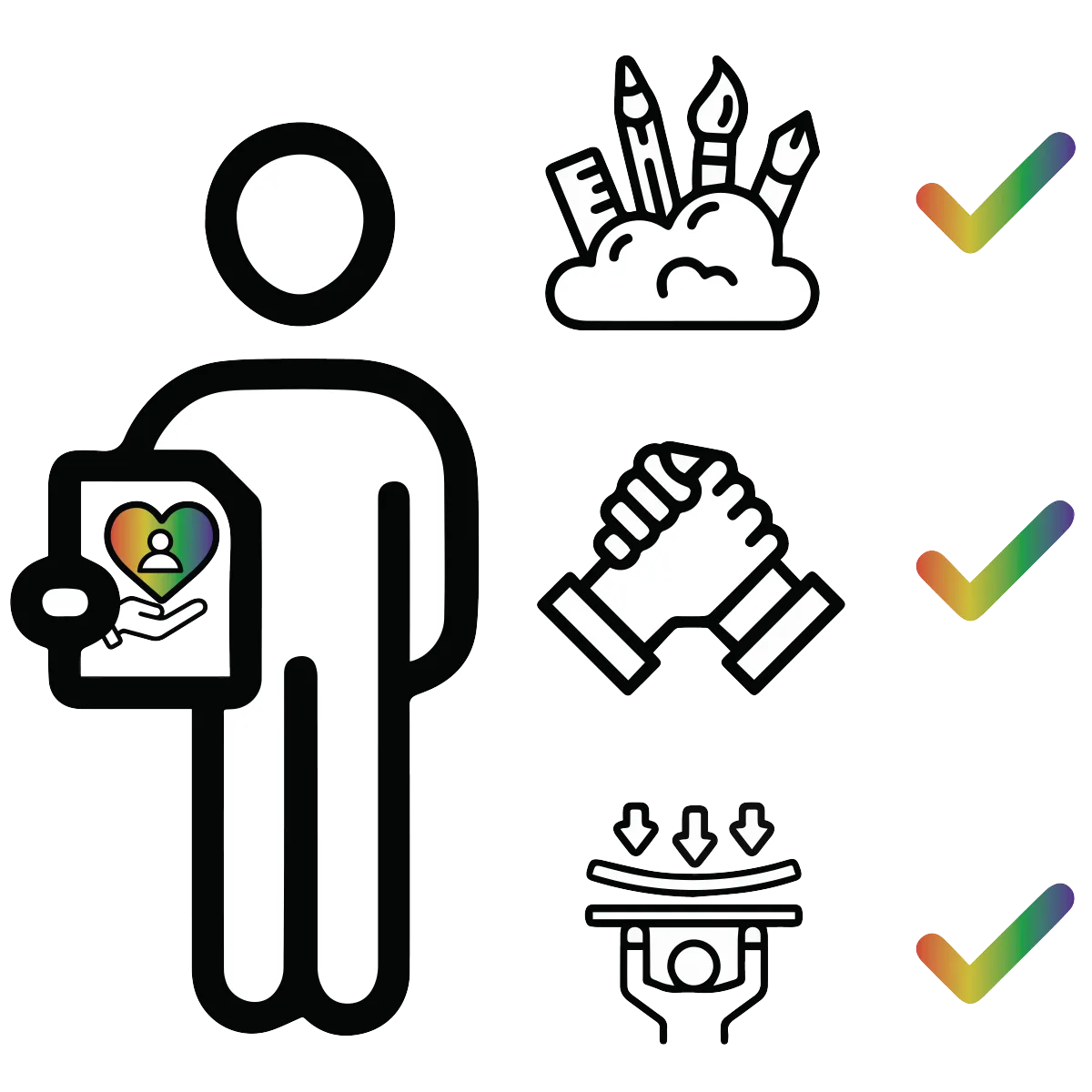
Caring Accountability
We love our clients as people and will do what is right by them.
We guarantee dedicated collaboration with you and your team throughout your training,
offering personalized feedback to ensure you achieve optimal results.
Empowering Excellence Through Tailored Solutions
Elevate performance, enhance leadership, and drive results across your organization

Meta Excellence Level 1
Achieve peak performance through foundational skills in leadership, teamwork, and personal growth.
This program equips individuals and teams to enhance their roles, build strong collaboration, and drive results across professional environments.

Sales Training Level 1
Build lasting client relationships and excel in relationship-based sales.
Focusing on rapport-building, efficiency, and leadership, this program transforms sales approaches for long-term client engagement and success.

Meta Excellence Coaching
Personalized coaching to cultivate leadership, resilience, and strategic thinking.
Our one-on-one coaching program supports growth in key areas like emotional intelligence, accountability, and problem-solving, empowering leaders to reach new heights.

"Working with Meta Excellence has completely transformed how my team operates. Justin helped us build sustainable habits that increased productivity, efficiency, and consistency in our workflows. The systems we implemented not only improved our deliverables but also made it easier to adapt and grow without burnout."
~ Georgio Zikantas - Founder/CEO CloseEase
Your Tools For Success

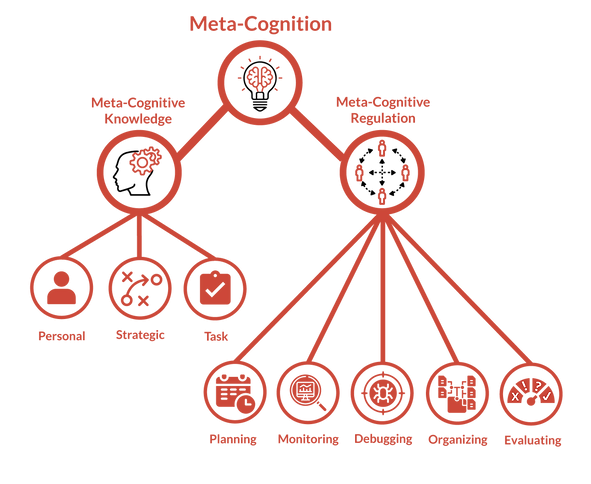
Your Tools For Success
Meta-Cognition
A suitable metaphor for Meta-Cognition is to imagine a leader within the human mind whose role is to plan, monitor, troubleshoot, store, and evaluate the thoughts of a person. This executive is equipped with an understanding of personal ability-levels as well as available strategies and knowledge.
Also known as 'thinking about thinking', Meta-Cognition is a process that can increase the effectiveness of problem-solving, creativity, and cognitive performance. Once learned, this process can be transferred into virtually every dimension of life, including the professional, personal, and even recreational level.
A suitable metaphor for Meta-Cognition is to imagine a leader within the human mind whose role is to plan, monitor, troubleshoot, store, and evaluate the thoughts of a person. This executive is equipped with an understanding of personal ability-levels as well as available strategies and knowledge.
Also known as 'thinking about thinking', Meta-Cognition is a process that can increase the effectiveness of problem-solving, creativity, and cognitive performance. Once learned, this process can be transferred into virtually every dimension of life, including the professional, personal, and even recreational level.

Meta-Character
Innovations in neuroscience reveal that emotions and thoughts are inseparable within the brain. Recent research shows that Meta-Cognition and Meta-Emotion work together as complementary processes. Related to these concepts, Meta-Wellness is the application of Meta-Cognition and Meta-Emotion to enhance our wellbeing.
Traditional views of personal needs treat them as a hierarchy, developed in a particular order from physiological, safety, and love needs, to esteem, self-actualization, and transcendent needs. Modern science shows that all needs are important, with each need affecting the other. Expanding on recent scientific research, the Meta-Wellness Model features an ‘Entangled Self’ with five equally supported ‘Selves’: Meta-Physical, Meta-Responsive, Meta-Passionate, Meta-Relational, and Meta-Core.
Regardless of background, tradition, or origin, character can be defined as the set of universal virtues or positive traits. Researchers have measured and defined these traits, but Meta-Character extends beyond the research by aligning thoughts, feelings, and actions with virtues to fully optimize performance and versatility. There are eight complementary virtues which make up Meta-Character: wisdom and courage, temperance and compassion, justice and transcendence, and fluency and harmony.


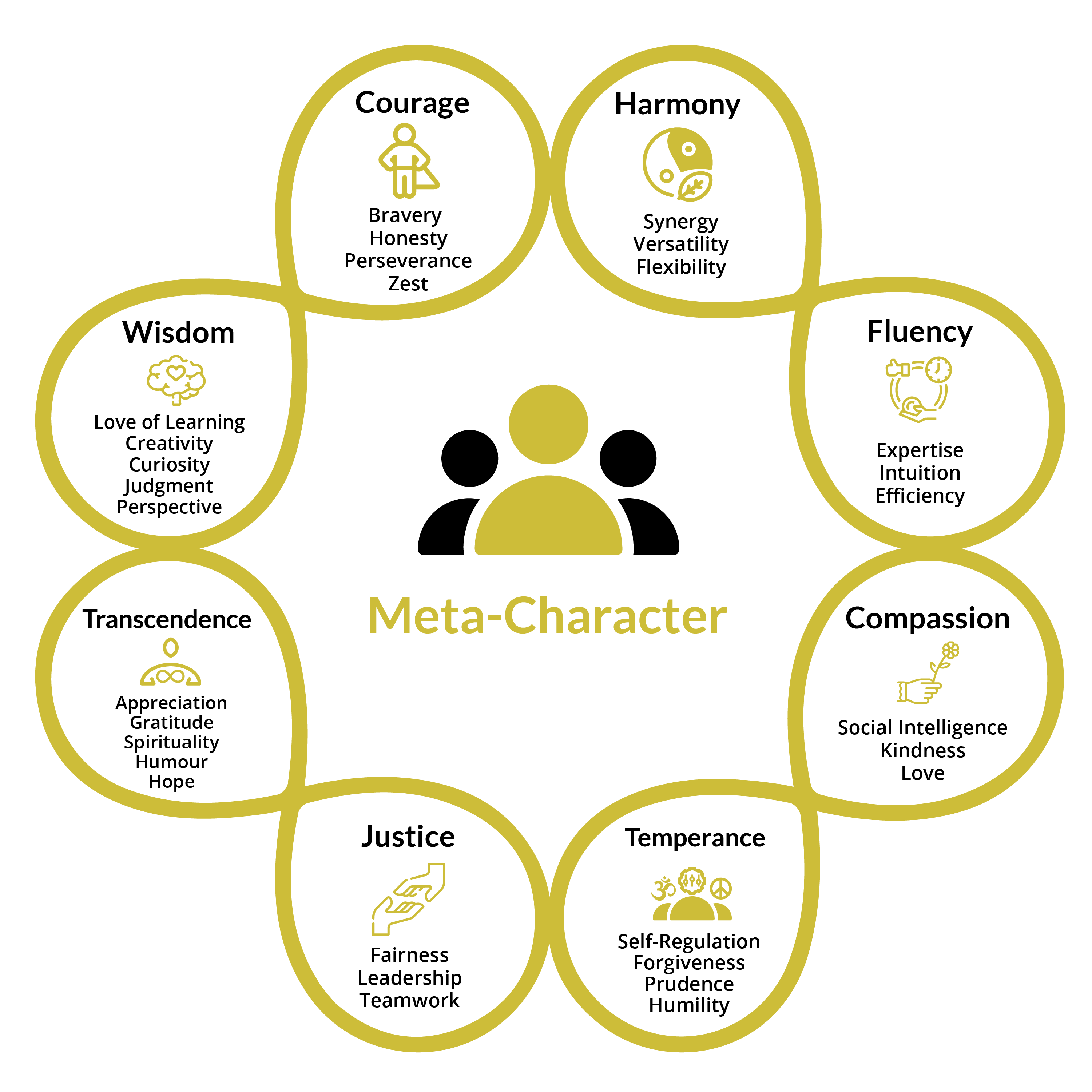

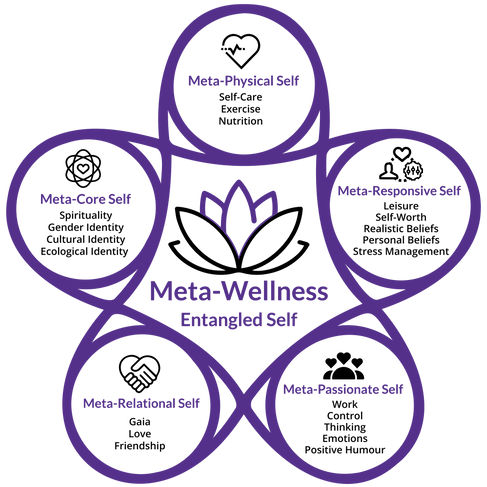
Meta-Wellness
Innovations in neuroscience reveal that emotions and thoughts are inseparable within the brain. Recent research shows that Meta-Cognition and Meta-Emotion work together as complementary processes. Related to these concepts, Meta-Wellness is the application of Meta-Cognition and Meta-Emotion to enhance our wellbeing.
Traditional views of personal needs treat them as a hierarchy, developed in a particular order from physiological, safety, and love needs, to esteem, self-actualization, and transcendent needs. Modern science shows that all needs are important, with each need affecting the other. Expanding on recent scientific research, the Meta-Wellness Model features an ‘Entangled Self’ with five equally supported ‘Selves’: Meta-Physical, Meta-Responsive, Meta-Passionate, Meta-Relational, and Meta-Core.
Innovations in neuroscience reveal that emotions and thoughts are inseparable within the brain. Recent research shows that Meta-Cognition and Meta-Emotion work together as complementary processes. Related to these concepts, Meta-Wellness is the application of Meta-Cognition and Meta-Emotion to enhance our wellbeing.
Traditional views of personal needs treat them as a hierarchy, developed in a particular order from physiological, safety, and love needs, to esteem, self-actualization, and transcendent needs. Modern science shows that all needs are important, with each need affecting the other. Expanding on recent scientific research, the Meta-Wellness Model features an ‘Entangled Self’ with five equally supported ‘Selves’: Meta-Physical, Meta-Responsive, Meta-Passionate, Meta-Relational, and Meta-Core.

Meta-Emotion
Meta-Emotion is like a guide whose role it is to understand and regulate emotions. This emotional attendant identifies and interprets emotions of the self and others, and is aware of strategies for regulating emotions.
Similar to Meta-Cognition, Meta-Emotion is “feeling about feeling”. It facilitates leadership by effectively strategizing and planning interactions. Relationships are monitored through the use of empathy. Conflicts are regulated collaboratively. Finally, communication strategies and techniques manage the flow of information. Upon identifying and interpreting feelings, Meta-Emotion restores a person to their centre. These processes are transferable into all social contexts at the individual, group, organizational, and societal levels.
Meta-Emotion is like a guide whose role it is to understand and regulate emotions. This emotional attendant identifies and interprets emotions of the self and others, and is aware of strategies for regulating emotions.
Similar to Meta-Cognition, Meta-Emotion is “feeling about feeling”. It facilitates leadership by effectively strategizing and planning interactions. Relationships are monitored through the use of empathy. Conflicts are regulated collaboratively. Finally, communication strategies and techniques manage the flow of information. Upon identifying and interpreting feelings, Meta-Emotion restores a person to their centre. These processes are transferable into all social contexts at the individual, group, organizational, and societal levels.




Proven Outcomes with Lasting Impact
See How We Make a Difference
When a growing tech company wanted to boost team performance and leadership, they turned to Meta Excellence Level 1. Through focused training on strategic thinking, collaboration, and accountability, their team achieved a 25% increase in project efficiency and saw a 30% rise in employee satisfaction. This transformation fostered a proactive, solution-oriented culture, empowering leaders across the organization and driving sustainable growth.
Embark on a Journey of Growth
and Transform Your Business today!
Connect with Meta Excellence™
What Our Clients Say

© 2024 Meta Excellence™ Inc.
Canadian Office:
P.O. Box 21033,
2670 Tecumseh Rd. West,
Windsor, ON, N9B 3T4
US Office:
PO Box 321134,
1401 W Fort St,
Detroit, MI, 48232

© 2024 Meta Excellence Inc.
US Office:
PO Box 321134,
1401 W Fort St,
Detroit, MI, 48232
Canadian Office:
P.O. Box 21033,
2670 Tecumseh Rd. West,
Windsor, ON, N9B 3T4
